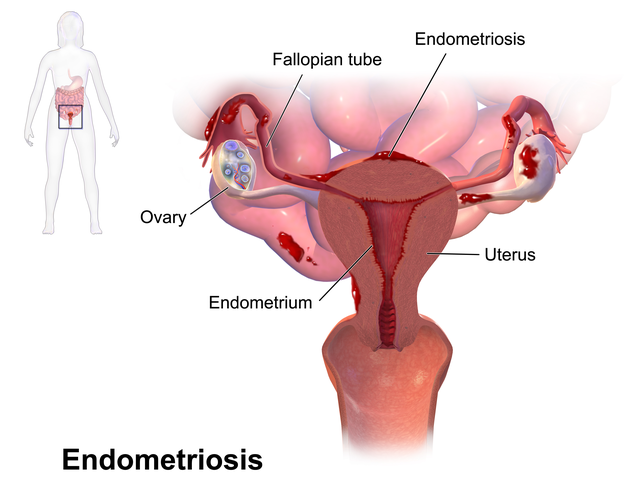
Endometriosis is a painful and often misunderstood condition that affects millions of women worldwide. While it can develop at any age, women over 35 may notice worsening symptoms that interfere with their daily lives. If you’re struggling with ongoing pelvic pain or irregular menstrual changes, endometriosis could be the underlying cause without you even knowing it.
In this post, we’ll explore what endometriosis is, five key signs that may indicate you have it, and ways to manage or even prevent it.
What Is Endometriosis?
Endometriosis occurs when tissue similar to the lining of the uterus (endometrium) grows outside the uterus. This tissue can grow on the ovaries, fallopian tubes, or even the intestines, triggering inflammation, scarring, and intense pain. Unlike the normal uterine lining, it has no natural way to leave the body, which can result in complications like cysts, adhesions, and fertility challenges.
Although the exact cause remains unclear, factors such as hormonal imbalances, genetics, and immune system disorders are thought to play a role in its development.
5 Signs You Might Be Struggling with Endometriosis.
1. Chronic Pelvic Pain.
One of the most common signs of endometriosis is ongoing pelvic pain, especially before or during your menstrual cycle. Unlike regular menstrual cramps, pain caused by endometriosis can be more intense and last for an extended period. It may also occur outside of your menstrual cycle, making daily activities difficult and uncomfortable.
2. Heavy or Irregular Periods.
If your menstrual flow has become unusually heavy or prolonged (lasting more than 7 days), it might be a red flag. Many women with endometriosis experience excessive bleeding, clotting, or unpredictable cycles that make it difficult to plan around their period.
3. Discomfort or Pain During Intimacy.
Many women dismiss pain during intercourse as normal, but it can be a key sign of endometriosis. When excess tissue grows near the reproductive organs, it can lead to deep pelvic pain during or after sex. The intensity of the discomfort can vary from mild to severe, often making intimacy difficult or distressing.
4. Digestive Issues and Bloating.
Endometriosis is often mistaken for digestive disorders like IBS (Irritable Bowel Syndrome) because it can cause bloating, constipation, diarrhea, and stomach pain. If you frequently experience these symptoms around your period, endometriosis could be the culprit.
5. Challenges with Conception.
For many women, endometriosis can be a significant barrier to pregnancy. The condition may lead to inflammation, scarring, and blockages in the fallopian tubes, making it harder for fertilization to occur. If you’ve been trying to conceive for a year or longer without success, it’s important to consider endometriosis as a possible cause and consult a doctor for further evaluation.
Possible Remedies and Treatments.
While there is no cure for endometriosis, several treatments can help manage symptoms and improve quality of life:
- Managing Pain: Over-the-counter medications like ibuprofen can help alleviate inflammation and reduce discomfort.
- Hormonal Treatments: Birth control pills, IUDs, or hormone injections can help regulate menstrual cycles and slow the growth of endometrial tissue. Latest research also reveals a new long term daily hormonal treatment called Relugolix–estradiol–norethisterone, also known as Ryego.
- Surgical Intervention: In severe cases, laparoscopic surgery (a minimally invasive procedure) may be necessary to remove excess tissue and improve fertility.
Lifestyle Adjustments: Maintaining a healthy diet, staying active, and practicing stress management techniques like yoga and meditation can naturally help control symptoms.
Is It Possible to Prevent Endometriosis?
Although there is no sure way to prevent endometriosis, making certain lifestyle adjustments may help reduce your risk:
- Adopt a Nutritious Diet: Limit processed foods and incorporate anti-inflammatory options like leafy greens, fatty fish, and turmeric.
- Balance Estrogen Levels: Minimize alcohol and caffeine intake, as both can increase estrogen levels and potentially worsen symptoms.
- Stay Active: Regular exercise supports hormonal balance and helps reduce inflammation.
- Manage Stress Effectively: High stress can aggravate symptoms, so practicing relaxation techniques like meditation or yoga may be beneficial.
IN CONCLUSION:
Endometriosis isn’t just about having painful periods—it’s a serious condition that can impact your daily life. If you notice any of these symptoms, it’s important to talk to a doctor and explore treatment options. Catching it early and managing it well can help you feel better and live more comfortably.
These testimonies of women who have experienced Endometriosis will shed more light.
See here, here, here, here, and here.


